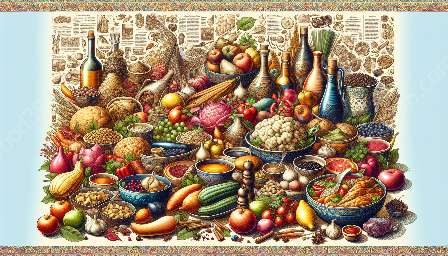Food technology and processing methods have undergone a remarkable transformation over the course of history, playing a pivotal role in the evolution of food culture. From the early agricultural practices of our ancestors to the sophisticated processing techniques of modern times, the journey of food technology offers a captivating narrative intertwined with the development of food cultures.
Early Agricultural Practices and the Origins of Food Culture
The story of food culture began millennia ago with the dawn of agriculture. Early human societies relied on primitive agricultural techniques such as simple cultivation and harvesting of crops. This shift from a hunter-gatherer lifestyle to settled agricultural communities laid the foundation for the development of distinct food cultures. As different regions across the globe adapted to their unique environments, diverse agricultural practices emerged, shaping the types of crops grown and consumed, as well as the culinary traditions of each society.
Impact of Advancements in Food Technology on Early Food Cultures
The progression of food technology has been intricately linked to the evolution of early food cultures. Ancient innovations such as fermentation, drying, and preservation methods enabled communities to store and utilize food resources more efficiently, leading to the development of culinary traditions and food preservation techniques that defined their cultures. The advent of pottery, for instance, facilitated the storage and transport of food, while the introduction of grinding and milling techniques allowed for the creation of diverse flour-based foods.
Revolutionary Food Processing Techniques: A Key Milestone
The advancement of food processing methods witnessed a significant leap forward during the Industrial Revolution, where the introduction of mechanical processes and large-scale production revolutionized food manufacturing. Innovations such as canning, pasteurization, and refrigeration reshaped the food industry, allowing for the distribution and preservation of food on an unprecedented scale. The ability to process and store food for extended periods also led to the standardization of food products, laying the groundwork for the mass consumption of packaged and processed foods that defined modern food culture.
Modern Innovations in Food Technology: Shaping Contemporary Food Culture
The contemporary food landscape continues to be shaped by ongoing advancements in food technology and processing methods. From the emergence of new preservation techniques such as freeze-drying and vacuum packaging to the development of novel food additives and flavor enhancers, the modern food industry has embraced cutting-edge technologies to meet the evolving demands of consumers. Furthermore, the application of genetic engineering and biotechnology has paved the way for the creation of genetically modified organisms (GMOs) and improved crop varieties, significantly impacting the agriculture and food production sectors.
Sustainable Food Technology: Addressing Environmental Concerns
As the global food industry confronts the challenges of sustainability and environmental conservation, the integration of sustainable food processing methods has become a focal point of innovation. Sustainable practices such as organic farming, efficient water usage, and renewable energy adoption are reshaping food production processes, emphasizing the importance of environmental stewardship in preserving food cultures for future generations. Additionally, advancements in food packaging materials and waste reduction strategies are contributing to the development of a more sustainable and eco-friendly food industry.
Technology and Culinary Fusion: Uniting Global Food Cultures
Moreover, the intersection of technology and culinary arts has accelerated the fusion of diverse food cultures, creating a globalized culinary landscape characterized by the integration of traditional and modern techniques. The accessibility of international cuisines, facilitated by advancements in transportation and communication, has broadened the culinary horizons of individuals worldwide, leading to the interchange of culinary practices and the coalescence of food cultures across continents.
The Future of Food Technology: Innovations and Challenges
Looking ahead, the future of food technology and processing methods is poised to witness unprecedented innovations and confront new challenges. The integration of artificial intelligence, robotics, and automation in food production and processing holds the promise of enhancing efficiency and quality control. However, ethical and societal considerations surrounding food technology, including issues related to food security, nutritional value, and labeling transparency, will continue to be subjects of ongoing debate and scrutiny.
Preserving Cultural Heritage in the Age of Technological Advancements
Amidst the rapid evolution of food technology, the preservation of traditional food cultures and culinary heritage remains a vital pursuit. Recognizing the intrinsic value of diverse food traditions, efforts to safeguard and promote traditional food production methods and indigenous culinary knowledge are fundamental in preserving the authenticity and richness of food cultures. Embracing innovation while respecting the cultural significance of traditional foods can ensure a harmonious coexistence between technological progress and cultural preservation.
Embracing a Holistic Approach: Balancing Technology and Tradition
In conclusion, the advancements in food technology and processing methods have played a central role in shaping the intricate tapestry of food cultures across history. From the early agricultural practices and the development of distinct food cultures to the constant evolution of modern food culture, the dynamic interplay between technology and tradition continues to shape the way we cultivate, process, and consume food. As we forge ahead, the harmonious integration of technological innovations with the preservation of cultural heritage presents an opportunity to embrace a holistic approach that honors the past while embracing the future of food technology.


